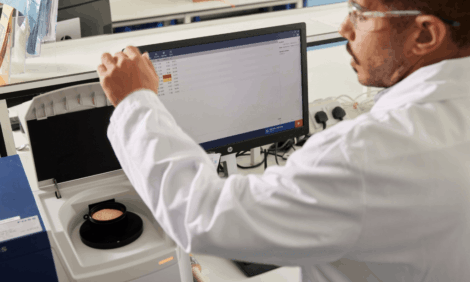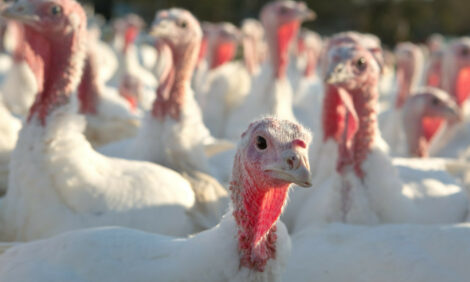



Automation of Hatching Egg Collection is Important to Broiler Breeder
Maximising hatchability and minimising floor eggs are the two most important criteria when equipping a new broiler breeder house, farmer Anton Janssen told ThePoultrySite editor, Jackie Linden when she visited his farm recently.At his farm in Reusel in the province of North Brabant in the south of the Netherlands, Anton Janssen houses broiler breeders. In total, he now has 45,000 Ross 308 females and 4,500 males on farm.
The latest expansion at Mr Janssen's farm is a new-build house for a total number of 13,500 birds – 12,200 females and 1,300 males. For the equipment of this new house, Mr Janssen worked in close cooperation with poultry equipment supplier, Vencomatic.
Together with Vencomatic, Mr Janssen looked at every detail to improve hatchability and minimise floor eggs. At the time of the visit to the farm, the birds were 41 weeks of age, and where laying at a rate of 78.5 per cent with less than one per cent floor eggs.
Every Egg Counts
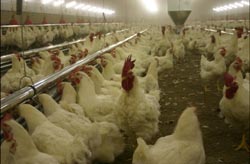
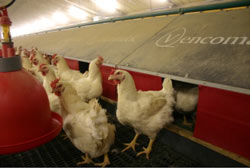
In today's broiler breeder operations, a small margin is made. It is important that no egg are lost and the maximum number of hatching eggs is delivered to the hatchery. This is the only way to survive and keep operations profitable.
Mr Janssen stressed the importance of a good nest box. "The nest should be attractive for the hen, so that all eggs are being laid in the nest. This not only reduces labour for collecting the eggs from the floor, but also decreases the chance for eggs to become dirty." As the floor egg percentage in his new house is lower than in the other existing houses, it seems the birds like the new Vencomatic nest.
The main reason to choose for the Vencomatic nest box where the tipping floors of the nest. With these tipping floors, birds are expelled from the nest, which prevents them littering the nest at night. The tipping floor also cleans the nest flooring, as all dirt and litter falls from the floors, when tipped. In this way, the nest always provides a clean and hygienic place for eggs to be laid.
Hatchability is No. 1 Concern
Hatchability is Mr Janssen's top priority, as this partly determines his income, which is based on a certain minimum hatchability, with a bonus for higher hatchability. His current partner is Belgium-based broiler hatchery Spoormans, which also provides Mr Janssen with pullets and feed.
In order to stimulate mating behaviour with his males, the house is equipped with winchable feeding lines. After feeding, the lines are winched, which provides more space for movement and mating.
Controlling feed intake is vital for broiler breeders to stop the birds becoming too heavy to breed. The males have special feeding lines. The birds at Janssens' farm are fed once a day, directly after the lights are put on in the morning. The hens get to eat first, followed by the males, 10 minutes later.
Next to male management, gentle egg collection is important for a good hatchability. Any hair cracks or other mechanical damages may cause a decreased hatchability and even exploding eggs in the hatcher. For this reason, Mr Janssen asked Vencomatic to take care of the complete egg collection, from the moment the egg leaves the hen until it is placed on the setter tray.
With the PSPC packer from Vencomatic's sister company Prinzen, the eggs are all being put on the setter trays with points down. This also has a positive effect on hatchability.
Maximising Efficiency of Labour
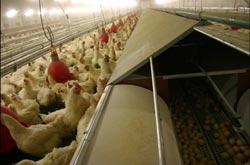
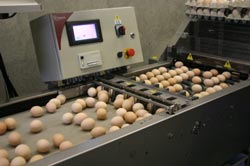
As the farm of Mr Janssen is a family-run business, it is very important for him to automate as much as possible. He and his wife are collecting the eggs together but also need to look after the birds and have time for other day-to-day business. The family only gets help for catching and cleaning the house.
"Fully automated egg collection and fewer floor eggs in the new house saves time for other important work on the farm," commented Mr Janssen. "Without the solutions from Vencomatic, we probably couldn't handle our current flock size and would need to get an employee to help with egg collection."
To keep diseases out, the farm operates an all-in, all-out policy, with the houses empty during the month of August. There are regular monthly visits from a breeding company veterinarian and also from another vet who covers exports as Mr Janssen's eggs are sent across the border to Belgium.
Video showcase
To see a video showcase of Mr Janssen's new broiler breeder house, you can visit www.vencomatic.net.June 2009










